NRAEF : Blog
NRAEF Summer Institutes Goes Digital – Meet the Instructors!
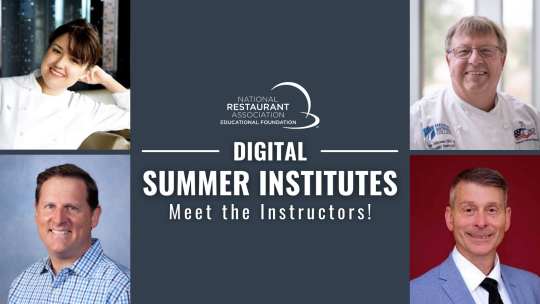
The NRAEF’s Summer Institutes provide technical and professional instruction for restaurant and foodservice educators. This year, Summer Institutes will be digital to ensure the safety and wellbeing our educators, still offering educators a valuable forum to hone their culinary and restaurant management instruction skills.
These online courses offer educators the opportunity to learn from nationally recognized faculty, network with peers and obtain continuing education credits to strengthen their foodservice education skills. With in-depth demonstration and lecture instruction, educators learn how to apply their course’s takeaways to their own classrooms.
Read on to learn more about some of our Summer Institutes instructors, and what they’re looking forward to this year.
John Johnson
Culinary Instructor – CEC, CCE, ACE
Madison College, Madison Wisconsin
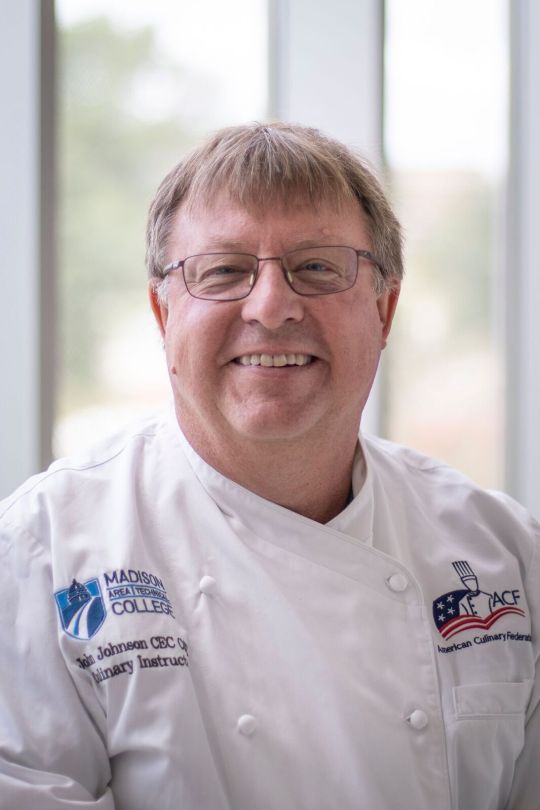
Courses Taught: Food Theory, Sanitation, Professional Cooking I & II, Garde Manger
Kitchen tools/ingredients you can’t live without: Chef Knife, rubber spatula, strainer, and a fish turner.
Favorite Industry Job you’ve held: Working at Berg Chaserrugg in Unterwasser Switzerland and skiing home each day from work.
Q: What do you hope educators get out of Digital Summer Institutes?
A: Learn new skills that will impact your classroom this fall! It might be about videotaping, or how to make a vinaigrette, mayo or learn how to breakdown a fish. Each person you interact with from faculty to other attendees have resources you might need in the classroom. If you need something for the classroom, ask. A recipe, a technique, video that was produced or a word document can be shared so you don’t have to rebuild something from scratch. Everyone can network and become more powerful in the classroom!
Kevin McGuinnis
Culinary Instructor
Madison College, Madison Wisconsin
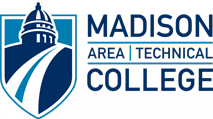
Courses Taught: Professional Cooking I & II, Advanced Skills Lab, Americana Cuisine, Breakfast, Catering, Garde Manger, Sanitation
Kitchen tools/ingredients you can’t live without: I always find myself going to my 25-year-old Wustoff Trident 10″ Chef knife and my favorite fry pan is made of rolled blue steel. You can season it just like cast iron and it performs nearly as well at about half the weight.
Favorite Industry Job you’ve held: Executive Chef at Parlor American in Chicago.
Q: Why do you teach Summer Institutes?
A: I am a big believer in the NRAEF ProStart program. Some of our best students have come from ProStart classrooms. I had the opportunity to mentor one of our Regional school’s programs and from there developed relationships with many of the FCE teachers in our area and I think they are doing an amazing job! I am more than happy to try and pass on some of my skills and knowledge to anyone who is interested.
Attending Summer Institutes is a great way to fulfill professional development requirements while also being able to meet new people or to see friends from other places, while at the same time learning something new that will truly be useful in the classroom.
Mark Molinaro
Associate Executive Director, Senior Chef Lecturer
Northern Arizona University
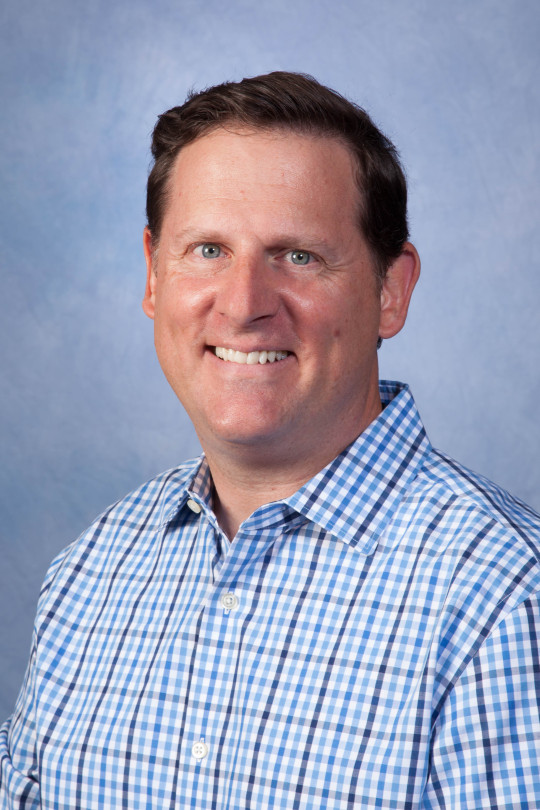
Courses Taught: Foundations in Kitchen Operations, Sustainable Gastronomy, Restaurant Design
Kitchen tools/ingredients you can’t live without: Salt, olive oil, fresh black peppercorns, herb garden and a sharp chef’s knife!
Favorite Industry Job you’ve held: My current job!
Q: Why should CTE and ProStart educators sign up for the Summer Institutes course?
A: For me this is one of the most condensed and potent weeks of learning for a chef educator. The combination of new people, new place, and new mindset allows for an impactful learning experience that can power you through the year ahead with passion and confidence! This has been a challenging year with hopefully lots of lessons learned and we as teachers should constantly be seeking ways to better connect with each other and our students for the betterment of the hospitality industry.
Sara Johannes
Culinary Arts Instructor / Culinary Department Chair
Saint Paul College
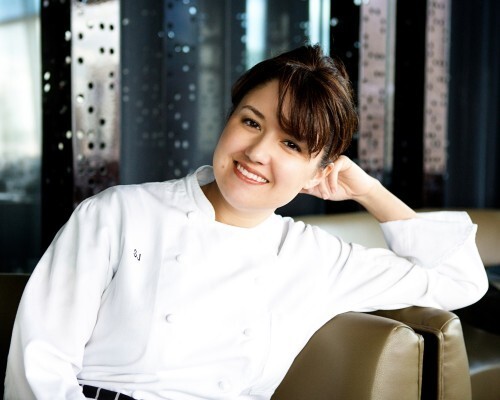
Courses Taught: Restaurant Operations, Menu Composition and Analysis, Contemporary Dining Room Service, Event Based Dining, Food, Beverage, and Labor Cost Control
Kitchen tools/ingredients you can’t live without: A sharp, well-maintained knife is essential. Learn the difference between honing a knife and sharpening a knife. Learn to use a whetstone. That knife will touch just about everything you serve in your kitchen.
Favorite Industry Job you’ve held: Executive Chef for Wolfgang Puck Fine Dining Group
Q: How has COVID-19 changed the way you approach teaching?
A: The pandemic has changed our industry quite a bit. As a culinary arts program, we have had to respond to that by updating our practices. Food safety and sanitation was an obvious first step, as it was for so many restaurants. We pivoted to “to go” options in our student-run restaurants, and installed shields and screens. Even learning to smell and taste while wearing a mask became a new skill. But all this change has made us more flexible. It has made us more creative with our problem solving. Likewise, the need to help others has been a focus of the foodservice community in the Twin Cities as well. Food insecurity has increase exponentially due to the pandemic. We have been able to help provide meals to those in need through a partnership with Minnesota Central Kitchen. This has shown another side of foodservice to our students – the non-profit sector.
George Hendry, Ed.D., CCE,CEC
Director of the McCutchen House and Marriott Lab, University of South Carolina
McCutchen House and Marriott Lab, University of South Carolina

Courses Taught: Hospitality and Culinary Arts
Kitchen tools/ingredients you can’t live without: My knives, and good working equipment.
Favorite Industry Job you’ve held: This one!
Q: Why should CTE and ProStart educators sign up for the Summer Institutes course?
A: It is a great way to network with other individuals who are experiencing what they are experiencing. By being able to have a venue with others, problems can be solved from within your classroom and not through an administrative perspective which sometimes can be hindered by budgets or lack of understanding.
Robby Lybrand
Chef Instructor
University of South Carolina

Courses Taught: Quantity Food Production, Purchasing and Controls, ServSafe, Craft Beer, Breads, Pastas and Sauces, Tailgating 101
Kitchen tools/ingredients you can’t live without: A good Chef Knife, a good paring knife, garlic, and bacon. Do you really need anything else?
Favorite Industry Job you’ve held: Owner of a catering company and bistro
Q: What do you hope educators get out of Summer Institutes?
A: Confidence. All we are doing is cooking, it’s that simple. I hope they gain problem solving skills, ways to be creative and ways to help their students be successful. I think that by teaching these courses it empowers the teachers to teach better and with more confidence while in the Prostart classroom. Having a digital course allows teachers the opportunity to go back and refresh themselves anytime they need to. They can always pull on the resources to help them in the classroom.
2021 Summer Institutes registration is open now through May 18 – learn more here. For questions about registration or 2021 courses, email SIevents@restaurant.org
Latest Blog Posts
National Apprenticeship Week – November 13-19, 2023
This week, the NRAEF is honoring the value of restaurant apprenticeship in building industry careers for workers from all backgrounds.
Hospitality Pathways Conference In Review
NRAEF : BlogThis past week, the...
Mini Docs | Teen Chefs, Big Dreams (ProStart on Public TV)
A documentary that tells the inspiring story of the 2023 ProStart® teams and educator from Wilbur Cross High School in New Haven, CT as they work toward the ProStart competitions.
PODCAST – CEO Series: How NRAEF Programs Build a Strong Workforce and Industry
NRAEF CEO Michelle Korsmo speaks with former Board Chair Kent Walrack and current Chair James Fripp about the continued success of the foundation’s programs
PODCAST – ProStart: Educating Tomorrow’s Industry Leaders
Chef Patrick Phelan, 2023 ProStart® Teacher of the Year, shares insights on mentoring the next generation of restaurant workers and the value of the ProStart Program’s hands-on curriculum! Phelan was just recognized on-stage during the 2023 National ProStart Invitational in Washington, DC.
